Maintaining Efficient Production in Chemical Manufacturing
In chemical manufacturing, production efficiency is essential, impacting costs, resource utilization, and overall competitiveness. Plant Managers must navigate a unique set of challenges, from fluctuating raw material prices to stringent compliance standards and demand for quality consistency. With advancements in digital integration, tools like PlanetTogether, when synchronized with ERP systems such as SAP, Oracle, Microsoft, Kinaxis, or Aveva, offer a transformative approach to enhance efficiency, optimize workflows, and maintain agility in an increasingly complex environment.
This blog explores how integrated production planning and scheduling systems can streamline operations in chemical manufacturing facilities and enable Plant Managers to better meet their efficiency goals.
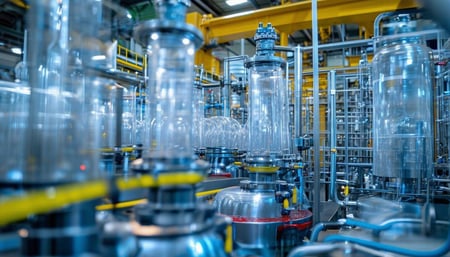
The Challenges of Maintaining Production Efficiency in Chemical Manufacturing
Chemical manufacturing is one of the most intricate sectors, characterized by sensitive processes, hazardous materials, and strict compliance standards. Among the most pressing challenges are:
Complex Process Control: Chemical production requires precision and control. Minor variances in temperature, pressure, or composition can lead to defective batches or unsafe products, which can be costly both financially and in terms of regulatory penalties.
Resource Intensity: Production processes are often resource-intensive, consuming large amounts of energy, water, and raw materials. Efficient resource utilization is essential to keep production costs low and minimize environmental impact.
Regulatory Compliance: Chemical manufacturers must adhere to stringent regulatory standards. Compliance demands not only adherence to production standards but also rigorous documentation and audit readiness.
Demand Fluctuation and Market Volatility: Demand for chemical products can be volatile, and price fluctuations in raw materials add unpredictability to planning. Without flexibility in production scheduling, manufacturers risk stockouts or overproduction, impacting profitability.
Given these challenges, the role of a Plant Manager in maintaining production efficiency involves balancing precise control, operational flexibility, and regulatory compliance. This is where integrated systems like PlanetTogether and ERP solutions come into play.
![]()
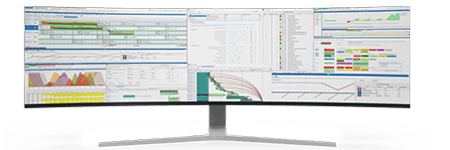
Integrated Systems: The Case for PlanetTogether and ERP Synchronization
Traditional production planning and scheduling methods, often based on Excel sheets or outdated software, struggle to keep pace with the real-time demands of a modern chemical manufacturing environment. Integrated systems offer a significant improvement. PlanetTogether, a production scheduling and optimization software, is designed to synchronize with leading ERP solutions such as SAP, Oracle, Microsoft, Kinaxis, and Aveva. This integration enables chemical manufacturers to unify planning, scheduling, and execution in real time, providing visibility across departments and levels of production.
Key Advantages of Integrated Systems
Centralized Data and Real-Time Visibility: Integration between PlanetTogether and ERP systems centralizes production data, creating a single source of truth for all stakeholders. Plant Managers can track inventory, labor allocation, and equipment status in real time, allowing for more informed decision-making.
Enhanced Flexibility and Responsiveness: By synchronizing production schedules with ERP data, integrated systems allow for dynamic adjustments to production plans. When there is a sudden change in demand or a supply chain disruption, Plant Managers can quickly adapt schedules, reducing the risk of costly delays or overproduction.
Improved Resource Allocation: Integrated systems provide data-driven insights into resource utilization, from raw materials to energy consumption. With a clearer understanding of resource allocation, Plant Managers can implement strategies to reduce waste, improve sustainability, and lower costs.
Regulatory Compliance and Traceability: Synchronizing PlanetTogether with ERP solutions enhances traceability throughout the production process, making it easier to comply with regulatory standards. All production data, including batch records and maintenance logs, are automatically updated and stored for easy access during audits or inspections.
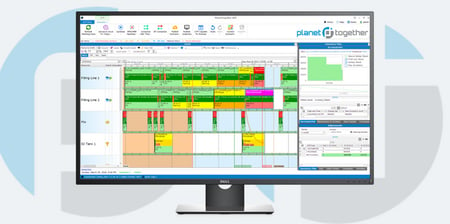
Implementing PlanetTogether and ERP Integration for Enhanced Efficiency
To maximize efficiency, Plant Managers need to establish a robust integration framework that supports real-time data flow between PlanetTogether and their ERP system. Here are key steps to implementing this integration successfully:
Define Goals and Metrics
First, clarify the specific efficiency goals you want to achieve. Common objectives in chemical manufacturing include reducing production cycle times, minimizing waste, and improving yield rates. Establishing clear KPIs helps you evaluate the impact of the integration. Typical metrics may include:
On-Time Production Rate: Measures how often production meets its scheduled start and end times.
Cycle Time Reduction: Monitors the average time taken for a batch to progress through production.
Resource Utilization Rate: Tracks the efficiency of raw material usage and energy consumption.
Synchronize Data Across Systems
To ensure real-time visibility, establish protocols for data synchronization between PlanetTogether and your ERP system. This might include sharing inventory data, work orders, equipment maintenance schedules, and production history. With SAP, Oracle, Microsoft, Kinaxis, or Aveva ERP systems, data synchronization is often achieved through APIs or middleware, allowing for seamless data exchange and reducing the need for manual entry.
Leverage Real-Time Scheduling
Using PlanetTogether’s advanced scheduling capabilities, Plant Managers can set up real-time production schedules that adapt to changes instantly. For instance, if a machine breaks down, the system can automatically adjust the production plan, minimizing downtime. By synchronizing scheduling data with the ERP, managers gain insight into how changes in production impact inventory levels, order fulfillment, and overall workflow.
Optimize Resource Allocation and Reduce Waste
With an integrated system, Plant Managers can gain insights into resource allocation, helping to identify areas where waste can be minimized. This includes optimizing raw material usage and reducing energy consumption by scheduling production during off-peak hours or automating batch processes for maximum efficiency.
Continuous Monitoring and Improvement
Once integration is established, it’s essential to continually monitor performance metrics and identify areas for improvement. Regularly review data from both PlanetTogether and the ERP system to uncover bottlenecks or inefficiencies. Use this feedback loop to refine production schedules and make incremental improvements in resource utilization and process control.
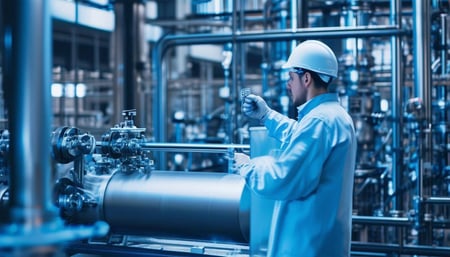
Overcoming Common Integration Challenges
Implementing an integrated system is not without challenges, particularly in a complex environment like chemical manufacturing. Here are some common hurdles and tips for overcoming them:
Data Quality: Inaccurate or outdated data can hinder the effectiveness of an integrated system. Ensure that data entered into both PlanetTogether and the ERP system is accurate and regularly updated.
Change Management: Transitioning to an integrated system can be a cultural shift. Engage and train team members on the benefits and functionalities of the new system to encourage adoption.
System Compatibility: Compatibility issues between PlanetTogether and certain ERP solutions can slow down integration. Consult with IT specialists to ensure proper middleware is in place and establish a seamless data flow.
For Plant Managers in chemical manufacturing, maintaining efficient production is essential not only for staying competitive but also for meeting regulatory and environmental standards. Integrated systems, like PlanetTogether synchronized with ERP solutions (SAP, Oracle, Microsoft, Kinaxis, or Aveva), offer a robust framework for achieving these efficiency goals. By centralizing data, optimizing resource allocation, and enabling real-time scheduling, integrated systems empower Plant Managers to respond dynamically to industry challenges and maximize operational performance.
Investing in integration can set your facility on a path toward sustainable, scalable, and profitable production, ensuring your processes are not just meeting the demands of today but are well-prepared for the challenges of tomorrow.
Are you ready to take your manufacturing operations to the next level? Contact us today to learn more about how PlanetTogether can help you achieve your goals and drive success in your industry.
Topics: PlanetTogether Software, Integrating PlanetTogether, Regulatory Compliance and Traceability, Chemical Manufacturing, Centralized Data and Real-Time Visibility, Define Goals and Metrics, Enhanced Flexibility and Responsiveness, Synchronize Data Across Systems, Leverage Real-Time Scheduling, Continuous Monitoring and Improvement, Optimize Resource Allocation and Reduce Waste







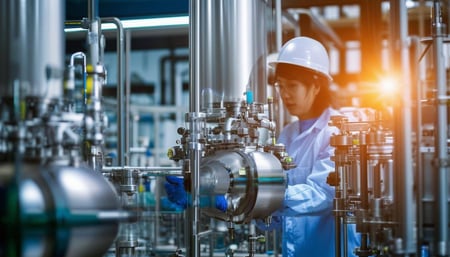













LEAVE A COMMENT